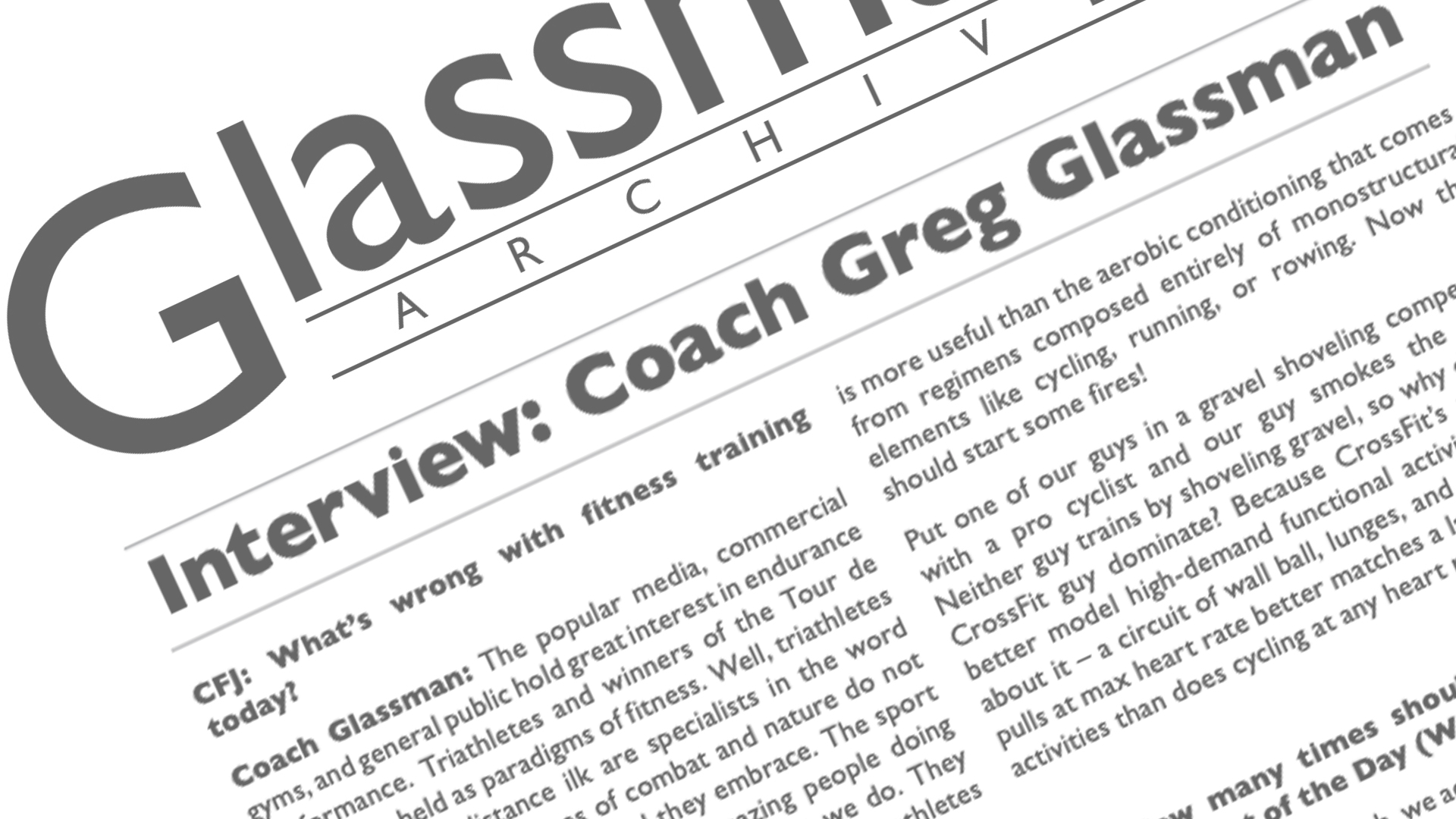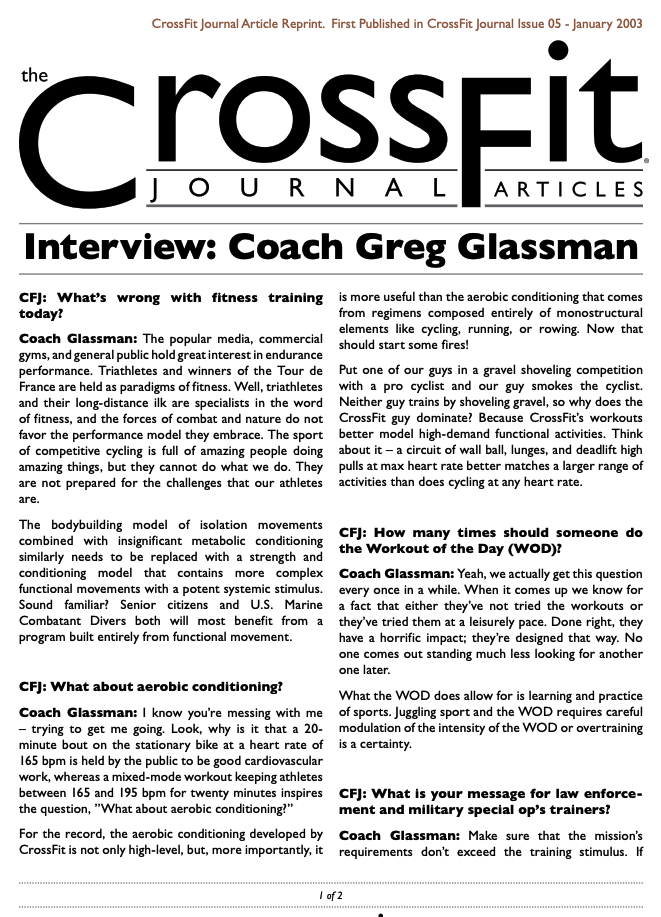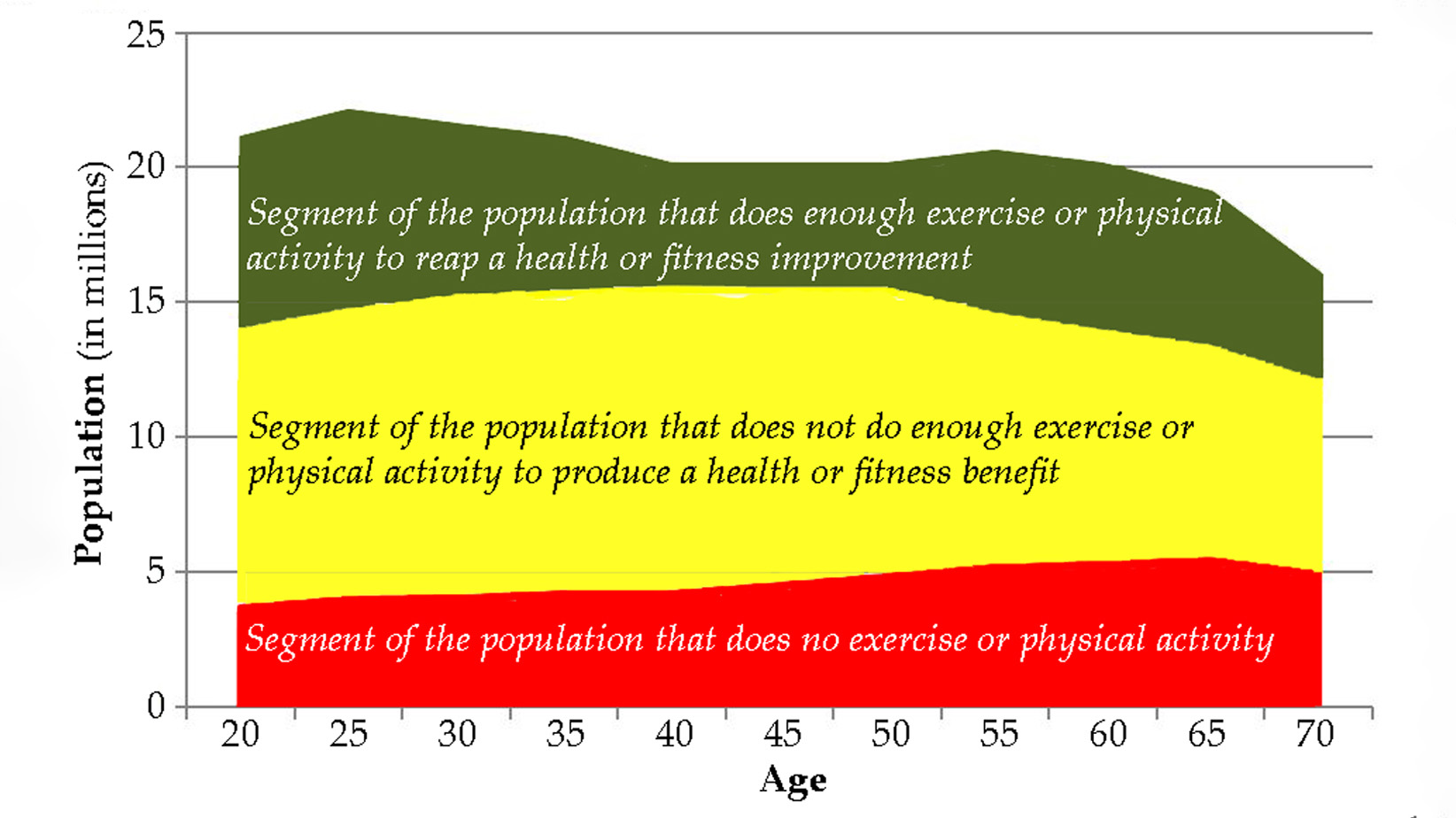CFJ: What’s wrong with fitness training today?
Coach Glassman:
The popular media, commercial gyms, and general public hold great interest in endurance performance. Triathletes and winners of the Tour de France are held as paradigms of fitness. Well, triathletes and their long-distance ilk are specialists in the word of fitness, and the forces of combat and nature do not favor the performance model they embrace. The sport of competitive cycling is full of amazing people doing amazing things, but they cannot do what we do. They are not prepared for the challenges that our athletes are. The bodybuilding model of isolation movements combined with insignificant metabolic conditioning similarly needs to be replaced with a strength and conditioning model that contains more complex functional movements with a potent systemic stimulus. Sound familiar? Senior citizens and U.S. Marine Combatant Divers both will most benefit from a program built entirely from functional movement.
CFJ: What about aerobic conditioning?
Coach Glassman:
I know you’re messing with me – trying to get me going. Look, why is it that a 20-minute bout on the stationary bike at a heart rate of 165 bpm is held by the public to be good cardiovascular work, whereas a mixed-mode workout keeping athletes between 165 and 195 bpm for twenty minutes inspires the question, ”What about aerobic conditioning?” For the record, the aerobic conditioning developed by CrossFit is not only high-level, but, more importantly, it is more useful than the aerobic conditioning that comes from regimens composed entirely of monostructural elements like cycling, running, or rowing. Now that should start some fires! Put one of our guys in a gravel shoveling competition with a pro cyclist and our guy smokes the cyclist. Neither guy trains by shoveling gravel, so why does the CrossFit guy dominate? Because CrossFit’s workouts better model high-demand functional activities. Think about it – a circuit of wall ball, lunges, and deadlift high pulls at max heart rate better matches a larger range of activities than does cycling at any heart rate.
CFJ: How many times should someone do the Workout of the Day (WOD)?
Coach Glassman:
Yeah, we actually get this question every once in a while. When it comes up we know for a fact that either they’ve not tried the workouts or they’ve tried them at a leisurely pace. Done right, they have a horrific impact; they’re designed that way. No one comes out standing much less looking for another one later. What the WOD does allow for is learning and practice of sports. Juggling sport and the WOD requires careful modulation of the intensity of the WOD or overtraining is a certainty.
CFJ: What is your message for law enforcement and military special op’s trainers?
Coach Glassman:
Make sure that the mission’s requirements don’t exceed the training stimulus. If you’re working a program where your men and women are running on M, W, F and working upper-body weight training on T-Th, like we’ve seen so often, your product is not optimally prepared. Arrest and control is not aerobic like the Tour de France; it’s anaerobic like cage fighting.
CFJ: What is the best way to start CrossFit?
Coach Glassman:
If you are not intimate with the elements of the CrossFit routines (squat, deadlift, clean, pull-up, push-up, box jump, etc) then gaining familiarity has to be the first step. If you are unfamiliar or less than very confident with the elements, then nearly any regimen with the singular focus of learning the sound mechanics of basic movements is a perfect prescription for the first month or two. For those new to the CrossFit method it will be necessary to establish consistency with the Workout of the Day before increasing the intensity of the workouts. The workouts exceed the capacity of the fittest men on earth. Be careful.
CFJ: What about nutrition?
Coach Glassman:
Meat and vegetable, nuts and seeds, some fruit, little starch, no sugar. End of subject.
CFJ: What are your favorite exercises?
Coach Glassman:
Cleans, push-ups (across 180 degrees – from handstand push-up to dip), squats, jumps, running, deadlifts, rowing, cycling, pull-ups, muscle-ups, presses, presses to handstand, wall ball, dumbbell and kettlebell swings, lunges, snatches, rope-climbing (and other non-technical climbing), sit-ups (and gymnastic variations on the sit-up theme).
CFJ: Do you have a program for…?
Coach Glassman:
This is another question that I see daily. We are asked for workouts for baseball, karate, swimming, dance, boxing, but they all get the same thing – CrossFit. The athletes, firefighters, soldiers, and cops that we work with have benefited most from increased practice within their disciplines and better general fitness. We design and deliver a broad-based general fitness. The need for specificity in sport is nearly perfectly met within the training and practice of the sport. There’s a strong and mistaken belief that every sport requires a separate and distinct strength and conditioning prescription. The notion is nonsense.
CFJ: Why the CrossFit Journal?
Coach Glassman:
Why is there nothing in the popular media that both the professional athlete and dedicated fitness enthusiast could find useful? That’s the niche we’re trying to fill. The idea behind the CrossFit Journal is simply to support and expand the CrossFit community by offering information that, like our workouts, is potent and brief. The rest is a distraction.
CFJ: Why gymnastics, weightlifting, and sprinting?
Coach Glassman:
Gymnasts have no peer in trunk and hip flexion, upper-body strength in multiple joint angles, agility, accuracy, balance, coordination. Their domain is body control. Weightlifters are masters of power, speed, and hip and leg strength. Powerful hip extension is the most critical element of human performance and none have the capacity of the weightlifters. Sprinters have enormous physical potential due to their metabolic competency across anaerobic and aerobic pathways and because of the speed, power, and total conditioning that sprinting demands. Blending workouts from each domain gives us a total greater than the sum of the parts – a gorgeous hybrid.
This article, by BSI’s co-founder, was originally published in The CrossFit Journal. While Greg Glassman no longer owns CrossFit Inc., his writings and ideas revolutionized the world of fitness, and are reproduced here.
Coach Glassman named his training methodology ‘CrossFit,’ which became a trademarked term owned by CrossFit Inc. In order to preserve his writings in their original form, references to ‘CrossFit’ remain in this article.
Download a pdf of the original article HERE.
Greg Glassman founded CrossFit, a fitness revolution. Under Glassman’s leadership there were around 4 million CrossFitters, 300,000 CrossFit coaches and 15,000 physical locations, known as affiliates, where his prescribed methodology: constantly varied functional movements executed at high intensity, were practiced daily. CrossFit became known as the solution to the world’s greatest problem, chronic illness.
In 2002, he became the first person in exercise physiology to apply a scientific definition to the word fitness. As the son of an aerospace engineer, Glassman learned the principles of science at a young age. Through observations, experimentation, testing, and retesting, Glassman created a program that brought unprecedented results to his clients. He shared his methodology with the world through The CrossFit Journal and in-person seminars. Harvard Business School proclaimed that CrossFit was the world’s fastest growing business.
The business, which challenged conventional business models and financially upset the health and wellness industry, brought plenty of negative attention to Glassman and CrossFit. The company’s low carbohydrate nutrition prescription threatened the sugar industry and led to a series of lawsuits after a peer-reviewed journal falsified data claiming Glassman’s methodology caused injuries. A federal judge called it the biggest case of scientific misconduct and fraud she’d seen in all her years on the bench. After this experience Glassman developed a deep interest in the corruption of modern science for private interests. He launched CrossFit Health which mobilized 20,000 doctors who knew from their experiences with CrossFit that Glassman’s methodology prevented and cured chronic diseases. Glassman networked the doctors, exposed them to researchers in a variety of fields and encouraged them to work together and further support efforts to expose the problems in medicine and work together on preventative measures.
In 2020, Greg sold CrossFit and focused his attention on the broader issues in modern science. He’d learned from his experience in fitness that areas of study without definitions, without ways of measuring and replicating results are ripe for corruption and manipulation.
The Broken Science Initiative, aims to expose and equip anyone interested with the tools to protect themself from the ills of modern medicine and broken science at-large.
Support the Broken Science Initiative.
Subscribe today →
recent posts
Expanding Horizons: Physical and Mental Rehabilitation for Juveniles in Ohio
Maintaining quality of life and preventing pain as we age.




